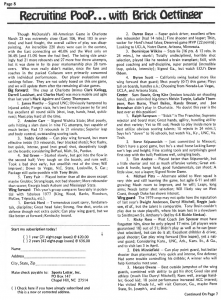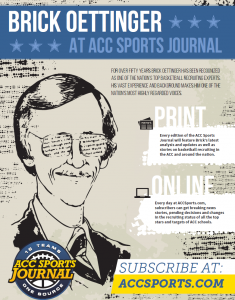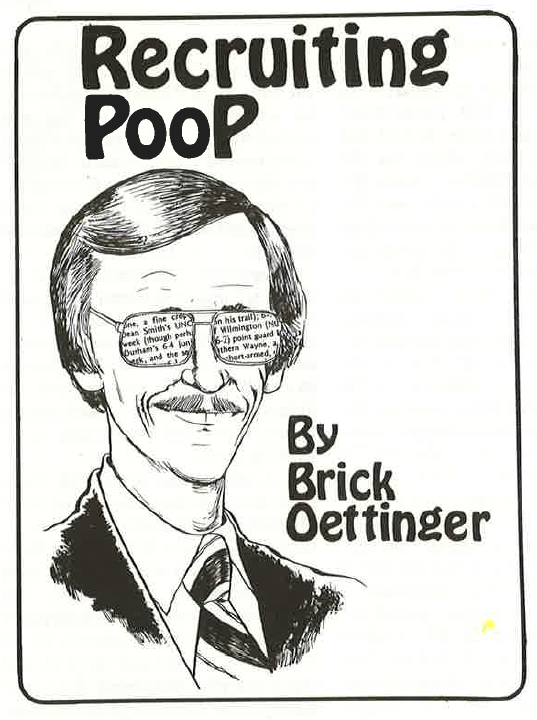My friend is dying.
If you recognize his name, either from here at ACCSports.com or otherwise, I hope you’ll consider writing an email (boettinger@twc.com) to him, and the sooner the better. It may take you only a minute to recognize this special, 79-year-old gentleman — that’s definitely the right word — who has lived an extraordinary life and, perhaps, has contributed in some way to yours.
Brick Oettinger is, above all else, a special person, a celebrated father, husband, son, brother, mentor and friend. He is that rare example of being brilliant and impactful at what he does, but somehow even more impressive for who he is.

In our three-plus decades together as friends and co-workers, we’ve regularly experienced intense deadline pressure, and even occasionally severe personal stress points, yet he’s been unwaveringly kind, warm, calm, genteel, thoughtful, unselfish and supportive. The incredible, superhuman consistency of both his beautiful spirit and distinctive writing initially inspired me as a 20-year-old journalist, and later his words and his work quietly contributed to my decision to become a business owner and begin an unexpected career as a sports-minded entrepreneur.
I truly admire, love and respect Brick, and I’ll never be able to thank him enough for his impact on me.
I know dozens of others who have similar feelings. Dave Telep, now the player personnel director of the NBA’s San Antonio Spurs, flew into town earlier this week to join me for a heart-warming, two-hour visit with Brick, now bedridden and under hospice care at his Durham home with a rare form (multiple system atrophy) of Parkinsonism. While his body is failing him, Brick’s famously encyclopedic mind (it’s truly stunning) remains as sharp as a surgeon’s scalpel.
Brick would never tell you this, because he is to authentic humility what Michael Jordan was to competitive fire, but he also is one of the top basketball recruiting writers in American history.
The Recruiting Guru
From 1974, when he started freelancing for newspapers in Charlotte, Durham, Greensboro and Raleigh, all the way into 2022 (he is writing his “farewell” column now), he has been among the most consistent, reliable, influential voices in a corner of the sports journalism world that gradually has grown from an intriguing but tiny niche into a mega-million-dollar industry.

The bulk of Brick’s work has appeared in the pages of the ACC Sports Journal and here at ACCSports.com, the magazine/website combination I helped launch in the mid-1990s and later owned for many years. We also featured his work at PrepStars.com and in the pages of the Recruiter’s Handbook. Around that same time, the folks who ran the McDonald’s All-American Game invited Brick to join their selection committee, on which he served from 1995-2016.
Soon after his early newspaper freelance work, Brick became the basketball recruiting writer for a newsletter known as “The PooP Sheet,” which launched in 1977 and soon began to feature Brick’s columns in every edition. All told, he has practiced his unique craft for 49 consecutive years, with one final contribution on the way.
It’s difficult to explain fully the depth of my respect for Brick, but here is one hopefully telling example. Many years ago, I had decided that I was either leaving the ACC Sports Journal and ACCSports.com (as their long-time editor and lead writer) or, thanks in large part to my other income as an attorney, I was going to purchase the company. It’s one thing to supervise a staff of 25-50 contributors; it’s another to both edit their articles and (gulp) sign their paychecks.
At one of the most important career forks of my life, I had conversations with perhaps a dozen people, but these were the four who mattered most (in order): 1-my wife, 2-Brick, 3-my attorney, and 4-my business partner. If I didn’t hear what I needed to hear from any person on that list, I wouldn’t even bother calling the next person on the list. If I didn’t get four straight green lights, I wasn’t going to buy the company. Brick’s loyalty, and his willingness to continue his extensive, stellar contributions (his meticulous columns often consumed six pages in our old, 24-page, newsprint-style version of the magazine) indefinitely, meant that much to me.
No ‘I’ in Team
When I first met Brick, more than 30 years ago, I learned quickly that he loved to write and talk about basketball but that he didn’t seem to enjoy talking about himself. My questions about prospects, coaches, teams or tactics typically would draw long, detailed, fascinating answers; my questions about him always would be answered politely, but with much shorter responses.
Whether in 1990 or here in 2022, I have pestered Brick to talk at least a little bit about himself, even though it’s absolutely, positively not in his nature. Decades ago, over lunch, I would ask four straight questions about basketball, then I’d slip in a personal query. I was the young, curious, inquisitive, playful puppy; thankfully, he was too kind to just shoo me away with a paw.
I remember getting him to laugh at some of my questions. For example, when a basketball fan or reader hears or sees the word “brick,” there’s an automatically negative connotation. Was it possible that one of the nation’s leading basketball recruiting writers was so bad at the game himself that his airballs and rim-wreckers earned him the “Brick” nickname, on the playground or otherwise? Surely, I thought to myself at the time, somebody has to ask, right?!

As it turns out, Elmer Rosenthal Oettinger III has been known as “Brick” literally since the day he was born. Brick’s father, who wanted a namesake but also hoped to find a nickname for him, took one look at his newborn son’s brick-red hair and called him “Brick.” Brick’s mother liked the name, too, and while Brick’s hair color turned to brown within a year of his birth, his colorful nickname lasted a lifetime. To this moment, I’ve never heard him called anything else.
What Brick didn’t mention at the time — again, that’s his way — was that he was an outstanding basketball player. A three-year starter at Chapel Hill High School, and the team MVP during his senior season, he even played for a while on UNC’s freshman team during the 1960-61 season. He typically was matched in practice against Mike Cook, who went on to play three varsity seasons for brand-new head coach Dean Smith and the Tar Heels.
As an adult, Brick was an outstanding tennis player for decades, competing in and often winning various age-bracket events, before slowing down a bit in his 70s. He now believes that some balance issues and unexpected falls about a decade ago, on and off the court, were a precursor to his MSA diagnosis (several years ago), which he kept private until recently, when his inability to walk reflected the rapid acceleration of his debilitating, unforgiving disease.
Amazingly, while many of his readers assumed that sports writing was Brick’s full-time job, that never was the case. He actually used the large majority of his vacation time from his “real job,” plus countless weekends and holidays, to travel the nation and observe the top high school basketball prospects at various all-star games, Nike/adidas and other summer camps, and a wide variety of prep-level tournaments and additional events, near and afar.
Giving Back
In 1974, UNC hired Brick to create and run its Correctional Education Program, which is a partnership between the North Carolina Department of Correction and what is now called UNC’s Friday Center for Continuing Education. More than 200 eligible inmates from the state’s lower-security populations have earned university diplomas (including some master’s degrees and doctorates) through the program, and countless others have taken classes, earned college credits and had access to a variety of other educational services.
Perhaps because of the fundamental goodness he carries at his own core, Brick always spoke optimistically and often proudly about his inmate-students, who typically came from severely disadvantaged backgrounds and were convicted of economic (nonviolent) crimes. He firmly believed in second chances, created a successful program that helped provide them, and never stopped believing in the fundamental goodness of most people.
Many of the students in the Correctional Education Program became basketball players for Brick, too. To the surprise of exactly nobody, in his 13 years of coaching in the North Carolina Prison League, Brick — the guy who just lives, breathes, dissects, enjoys and knows hoops from every angle! — led seven of his teams to the state championship. He coached similarly successful teams in the Orange County Public League, including one that finished 34-0.
When I spoke with Brick recently, and our conversation became a wonderful mixture of life stuff and (of course!) basketball, I asked a question I probably also asked him in 1990: What do you remember about being the first recruiting writer to tell the world about Michael Jordan?
Because I know Brick so well after all these years, I knew he’d correct me on the name (“He was just Mike Jordan back then”), and I anticipated almost word-for-word his eternal scouting report (“The best combination of basketball skills, physical abilities and intangibles from a high school wing guard I’ve ever seen”), which he first wrote in 1979.
Then the human encyclopedia started flipping through other interesting pages, one by one, from the mental notes he took more than four decades ago. Brick recalled the first person who gave him a tip about Jordan (then-UNC assistant coach Roy Williams), the elite player Jordan bumped to #2 in his Class of 1981 player rankings (Patrick Ewing), and then a litany of details about the first time he saw Jordan play in person.
It’s one thing to mention Jordan’s academic year (junior) at the time, or his high school (Wilmington Laney). It’s next-level awesome to add, 43 years later, the location of the game (Dudley, near Goldsboro), the opposing team (Southern Wayne), the opponent’s top player (fellow UNC signee Lynwood Robinson), names and details about other players on each team, various coaching tactics (“They started the game double-teaming Jordan, and later there were times they triple-teamed him, which you don’t see often”) and even a rough estimate of the final score (“Laney by 30”).
“Jordan put on a show!” Brick said.
In one of my favorite movies, Waking Ned Devine, because of some extremely unusual plot twists, a beloved member of the community somewhat secretively attends (while plenty alive!) his own funeral, at which he is able to hear the heartfelt eulogies, stories and other memories of his closest friends and family members. That scene always has resonated with me as a moving, powerful reminder of the importance of celebrating greatness, and great people, in all of their many forms, especially while they’re still here to appreciate those sentiments.

Brick and his wife, Leah, have emphasized that at this difficult time they are taking a “celebration of life” approach to the days and weeks ahead. With their permission and encouragement, I ask you to help me celebrate this great man, a true North Carolina institution in more ways than one, and his many admirable qualities and accomplishments.
It’s OK if you don’t know Brick as well as I or others do. If you’ve ever read his stuff, perhaps even without noticing his byline or the notes-in-glasses graphic we used atop his columns for a long time, and it’s in your heart, please send a note to him directly (boettinger@twc.com). If you’ve met him in person, or maybe attended one of his many speaking engagements over the years, and it feels right, please send him an email, and please send it soon.
Kindness and excellence are always worth celebrating.
Like Michael, Brick — in his own, inimitable way — has put on a heck of a show, in his case for almost five decades now. He’s someone I’ll never forget, someone I’ll always cherish.
Cheers, Brick, and thank you.

















